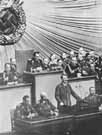
|
|
|

|

|

|

|
|
Click on an image to see a larger, more detailed picture.
|
|
|
|
|
| 1939: The War Against The Jews |

|
pg. 166 |

|
|
|
|
| |
 The Non-Aggression Pact between Germany and the Soviet Union, signed on August 23, 1939, postponed the inevitable military clash of the two powers, and set the stage for the German invasion of Poland. The Ribbentrop-Molotov Pact, as the agreement also was called, contained a secret protocol that divided Poland between the two larger nations. Seen here, from right, are Russian Foreign Minister Viacheslav Molotov, Russian dictator Joseph Stalin, and German Foreign Minister Joachim von Ribbentrop.
The Non-Aggression Pact between Germany and the Soviet Union, signed on August 23, 1939, postponed the inevitable military clash of the two powers, and set the stage for the German invasion of Poland. The Ribbentrop-Molotov Pact, as the agreement also was called, contained a secret protocol that divided Poland between the two larger nations. Seen here, from right, are Russian Foreign Minister Viacheslav Molotov, Russian dictator Joseph Stalin, and German Foreign Minister Joachim von Ribbentrop.
Photo: United States Holocaust Memorial Museum Photo Archive
|
 Hitler addresses the Reichstag on September 1, 1939. Germany's war with Poland--and his biggest-yet grab for "living space"--had begun. Hostilities were initiated following a foolish masquerade in which German soldiers dressed in Polish Army uniforms attacked a radio station in the German border town of Gleiwitz.
Hitler addresses the Reichstag on September 1, 1939. Germany's war with Poland--and his biggest-yet grab for "living space"--had begun. Hostilities were initiated following a foolish masquerade in which German soldiers dressed in Polish Army uniforms attacked a radio station in the German border town of Gleiwitz.
Photo: United States Holocaust Memorial Museum Photo Archive
|
 Joachim von Ribbentrop
Joachim von Ribbentrop
Ecstatic with the foreign policy triumphs of 1938-39, Hitler hailed his foreign minister, Joachim von Ribbentrop, as "a second Bismarck" and a "genius." Most others saw Ribbentrop as an arrogant, incompetent upstart (nicknamed "von Ribbensnob") and a fawning flatterer of the Führer. Joseph Goebbels, the Reich press chief, described Ribbentrop as "witless and undiplomatic, touchy and subservient." Goebbels contemptuously remarked that Ribbentrop had "bought his name, married his money, and swindled his way into office." Ribbentrop's marriage into a wealthy champagne-producing family, his foreign business contacts, and his command of languages made him appear to Hitler as a man of the world. Although Ribbentrop was a latecomer to the Party, Hitler nonetheless rapidly promoted him within the foreign office. In 1935, as ambassador-at-large, Ribbentrop negotiated the Anglo-German Naval Agreement. Ribbentrop became ambassador to Britain in 1936 and the Reich's foreign minister in 1938. He convinced Hitler that Britain was weak and unwilling to oppose aggressive German policies. In negotiating the 1939 nonaggression pact with the Soviet Union, Ribbentrop paved the way for the conquest of Nazi Lebensraum. The unscrupulous diplomat was found guilty of war crimes in 1946. Showing no remorse, he was the first Nazi defendant hanged at Nuremberg.
Photo: Main Commission for the Investigation of Nazi War Crimes in Poland/United States Holocaust Memorial Museum Photo Archive
|
|

|

|

|

|
 August 17, 1939: The Reich Ministry of the Interior publishes a listing of allowable first names Jewish parents may give their new babies.
August 17, 1939: The Reich Ministry of the Interior publishes a listing of allowable first names Jewish parents may give their new babies.
|
 August 19, 1939: The Romanian-Jewish refugee ship Rim, bound for Palestine, runs aground and burns at Rhodes, Italy.
August 19, 1939: The Romanian-Jewish refugee ship Rim, bound for Palestine, runs aground and burns at Rhodes, Italy.
|
 August 22, 1939: Hitler's speech to generals urges the liquidation of Poles in the forthcoming war in order to gain Lebensraum ("Living space") for Germans.
August 22, 1939: Hitler's speech to generals urges the liquidation of Poles in the forthcoming war in order to gain Lebensraum ("Living space") for Germans.
|
 August 23, 1939: The German-Soviet Non-Aggression Pact (Ribbentrop-Molotov Pact) is signed in Moscow, freeing Hitler for the moment from the worry of an Eastern Front war. The pact contains a secret protocol on the disposition of Poland, which will be divided between the two larger nations.
August 23, 1939: The German-Soviet Non-Aggression Pact (Ribbentrop-Molotov Pact) is signed in Moscow, freeing Hitler for the moment from the worry of an Eastern Front war. The pact contains a secret protocol on the disposition of Poland, which will be divided between the two larger nations.
|
|
|
|
|
| 1939: The War Against The Jews |

|
pg. 166 |

|
|
The Holocaust Chronicle
© 2009 Publications International, Ltd.
|
|
